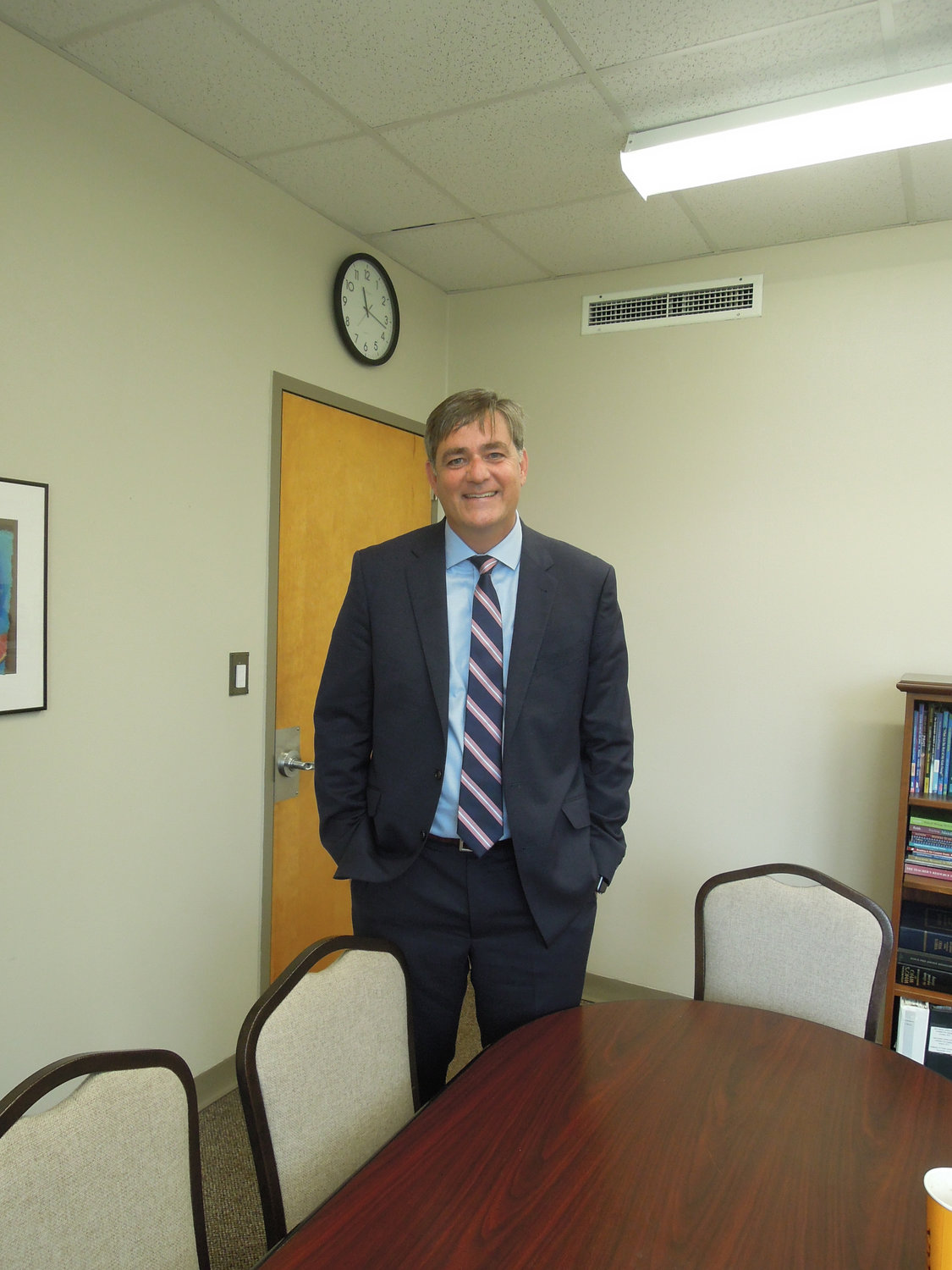Cracking the success code in Wantagh S.D.
McNamara leads schools toward tech integration
John McNamara seems thoroughly comfortable with himself and his role as superintendent of the Wantagh Union Free School District.
Now in his second year as superintendent and his fourth as one of the district’s ad-ministrators, Mc-Namara communicates a clear vision for the district and its students, based primarily on the technology that he hopes will prepare them for the world after school.
“Right now, we’re laying the foundations in the elementary schools for the things we want to do at the upper level,” McNamara said. This includes expanded science, technology, engineering, arts and mathematics, or STEAM, offerings that will enable students to “problem-solve using a variety of modalities, from engineering to coding to robotics,” he said.
McNamara described how the district had divided the new STEAM offerings into kindergarten-to-second grade and third-to-fifth grade programs. At the same time, the district offers coding courses for sixth-graders. “We added these courses two years ago,” McNamara said. “We also started offering coding Saturdays for kids who want to come in and learn more.”
McNamara was named to the top post after just two years as the district’s assistant superintendent for instruction and curriculum. Before coming to Wantagh, the Providence College and SUNY Stony Brook graduate was a middle school principal in the Plainview-Old Bethpage district. He also served as an assistant principal at Oldfield Middle School, in Greenlawn, and as social studies department chairman at Island Trees Middle School.
Pressed to name his proudest achievement at Wantagh, he pointed to the high school’s Advanced Placement Capstone program. The program, which was rolled out nationwide in 2016, offers students a chance to do in-depth study and research on a broad range of disciplines. Wantagh High School started its own Capstone program while McNamara was assistant superintendent. As superintendent, he joined students in celebrating the completion of the first two-year cycle.
He was quick to credit two teachers, Heather Naughten and Heather Jones, as having been instrumental in developing the program.
According to McNamara, Capstone is divided into two year-long modules. The first, called Capstone Seminar, open to 10th- and 11th-graders, familiarizes students with research techniques on range of topics. In the second module, Capstone Research, students pick a topic of study. “It allows students to develop research skills and techniques they’ll need in college or after,” he said. The culmination is a presentation of a research paper before a panel of teachers, including an oral defense.
McNamara said he attended some of the presentations last year. “They approach it like they might approach a college thesis project,” he said. The 40-some students who completed the program received Capstone endorsements on their diplomas.
Although many students choose technology- or science-themed projects, “It’s also an opportunity for students who want to do the humanities and the arts,” McNamara said. The course is open to any student who meets the basic A.P. criteria, he added.
McNamara didn’t shy away from the district’s financial issues, which are among the more difficult aspects of his job. “The biggest challenges are probably fiscal,” he said. “We don’t want to just maintain programs. We want to expand them and replace or update where needed, while at the same time being fiscally responsive to the community.”
He spoke of the difficulties posed by the state tax levy cap, as well as the uncertainties associated with the property tax grievance process. In addition, “not knowing how much state aid we’ll get is challenging,” he said. “We’ve tried to work through elected officials who will advocate for our needs.”
In addition to basic program and personnel expenses, “we always have a number of capital projects,” McNamara said. Last spring, voters approved the establishment of a $7.5 million capital reserve fund. The district passed a measure on Oct. 23 that will allow it to tap the fund for the replacement of three boilers at Wantagh Middle School. “They’ll cost about $800,000,” McNamara said, and outlined the onerous
process schools must go through in order to secure state approval for such projects.
“We could’ve waited until the annual vote on the budget, but we determined that the best time to replace [the boilers] would be in the summer of 2019,” he said. “So we decided to hold the election now.”
The school will submit a proposal by the end of the year. If all goes well, the state could grant its approval by next spring, according to McNamara. “Hopefully, we’ll get approval by March or so, and then we can begin replacing them in June,” he said.
Finally, McNamara spoke of his district’s efforts to upgrade school security. “We’ve taken a multi-faceted approach,” he said. “First, we’ve hardened the schools themselves by adding vestibules, or ‘man traps.’” The goal of the hardened entrances, with their multiple ID checks, is to limit traffic and eliminate drop-ins, he said. The district has worked with the Nassau County Police Department and has hired additional security personnel.
Equally important, McNamara said, are the district’s upgraded mental health initiatives. “Someone who feels a connection to the school and to the teachers is much less likely to commit these act of violence,” he said. So a guidance counselor has been added at the middle school — “This is the first time we’ve had a guidance counselor in a middle school,” he said — as well as a social worker at the high school. McNamara said he had noticed an uptick in the anxiety felt by many students in the wake of recent school shootings, and wanted them to be able to get the help they need.
“We want to be able to defuse trigger situations to help students feel more integrated into school life,” McNamara said. “The mental health compo-
nent is the part that needs to be ad-
dressed more.”

 47.0°,
Fair
47.0°,
Fair 





